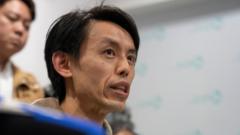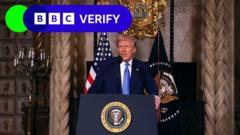The Alternative for Germany (AfD) party appears poised to become a significant player in German politics, leading to concerns about the implications for the country's political landscape and historical context. Amidst economic struggles and rising migration issues, the election results may not only influence Germany but also reshape the political dynamics across Europe.
Germany Faces Election Crossroads as AfD Gains Momentum

Germany Faces Election Crossroads as AfD Gains Momentum
As Germany approaches a pivotal election, the rise of the far-right Alternative for Germany (AfD) party ignites debate around national identity, economic challenges, and the future of democracy in the country.
A political earthquake is brewing in Germany as the hard-right nationalist party, Alternative for Germany (AfD), anticipates a substantial increase in its parliamentary presence following elections scheduled for this Sunday. Critics have labeled the AfD as "radical," "racist," and "anti-democratic," with Germany's domestic intelligence classifying the party as "anti-constitutional." If recent polls hold, the AfD could well become Germany's second-largest political entity, marking a significant shift in the nation's political dynamics, with potential repercussions throughout Europe.
The AfD resonates with growing populist sentiments across the continent, paralleled by similar movements in other European nations. The party draws inspiration from figures such as Donald Trump, adopting an "anti-woke," staunchly pro-fossil fuel, and cautious stance toward migration and military support in conflict zones like Ukraine. Such positions further complicate Germany's global diplomatic relations, especially given its past and significance as Europe's largest economy.
Historically, Germany's post-war political framework has been shaped by a collective memory aimed at averting a return to extremism, primarily due to its Nazi past. Yet, this longstanding belief in immunity from far-right ideologies is faltering under the pressure of current socio-economic challenges. Polling suggests a disillusionment among voters who once prided themselves on a successful and influential nation.
The roots of this discontent lie primarily in the erosion of Germany's economic stability. Criticisms abound regarding its reliance on outdated industries and a failure to transition into sectors like technology and alternative energy. As Germany grapples with an increasing dependency on external markets, frustrations grow over the lack of domestic investment in innovation and infrastructure. The recent collapse of a bridge in Dresden underscores these buried vulnerabilities.
Moreover, perceived military weaknesses have also been a sore spot among European allies. Following the Russian invasion of Ukraine, Chancellor Olaf Scholz promised military reforms, yet criticism continues regarding Germany's observed under-preparedness. The AfD's rhetoric, which advocates for improved domestic military strength while calling for diminished support to Ukraine, directly appeals to constituents anxious about national and regional security.
A critical aspect of the upcoming election is the contentious issue of migration, which has become a focal point for the AfD's campaign. Even as Germany welcomed a notable number of refugees during the last migration crisis, a recent spate of violent incidents attributed to migrants has polarized public sentiment. Despite claims of being neither racist nor anti-migration, the AfD's hardline stance on deportations of illegal immigrants and criminals has garnered support among voters who feel increasingly insecure.
The election arrives amid a backdrop of shifting political strategies, as both centre-left and centre-right parties tighten their rhetoric around immigration to stave off AfD's appeal. Although it is improbable that the AfD will join any coalition government due to the historical precedent in Germany for excluding far-right factions, its emerging influence reflects broader socio-political shifts.
Ultimately, the situation presents a complex paradox: while many Germans remain steadfast against the AfD's radical agendas, lingering cultural concerns and economic unease may inadvertently boost their political clout. As Germany approaches this critical juncture, the outcome of this election may dictate not only the future of its political landscape but also the broader implications for democracy and governance in Europe as a whole.





















